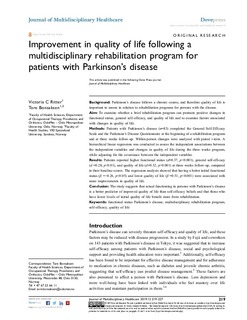| dc.description.abstract | Background: Parkinson’s disease follows a chronic course, and therefore quality of life is important to assess in relation to rehabilitation programs for persons with the disease.
Aim: To examine whether a brief rehabilitation program can promote positive changes in functional status, general self-efficacy, and quality of life and to examine factors associated with changes in quality of life.
Methods: Patients with Parkinson’s disease (n=83) completed the General Self-Efficacy Scale and the Parkinson’s Disease Questionnaire at the beginning of a rehabilitation program and at three weeks follow-up. Within-person changes were analyzed with paired t-tests. A hierarchical linear regression was conducted to assess the independent associations between the independent variables and changes in quality of life during the three weeks program, while adjusting for the covariance between the independent variables.
Results: Patients reported higher functional status (d=0.37, p<0.001), general self-efficacy (d =0.28, p<0.01), and quality of life (d=0.32, p<0.001) at three weeks follow-up, compared to their baseline scores. The regression analysis showed that having a better initial functional status (β =−0.26, p<0.05) and lower quality of life (β =0.51, p<0.001) were associated with more improvements in quality of life.
Conclusion: The study suggests that actual functioning in persons with Parkinson’s disease is a better predictor of improved quality of life than self-efficacy beliefs and that those who have lower levels of initial quality of life benefit more from rehabilitation | nb_NO |
